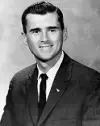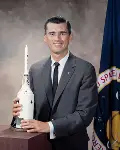Roger Chaffee was a Navy veteran and astronaut in the Apollo program. He died in the Apollo 1 launchpad fire. 
Chaffee was born on Feb. 15, 1935, in Grand Rapids, Mich. His father, Donald, was a former barnstorming pilot and took young Roger on his first flight when the boy was 7. A solid student and Eagle Scout, Roger attended schools in that city and graduated from Central High in 1953. Continuing his studies at the Illinois Institute of Technology and then Purdue University, he earned a bachelor of science degree in aeronautical engineering in 1957. He had been in the Navy ROTC and went on active duty the year he graduated from college. He trained in Florida and Texas and was cleared to fly as a pilot. Assigned to a photographic squadron in Jacksonville, Fla., he flew a series of reconnaissance missions over Cuba during the Cuban Missile Crisis in 1962. He completed aircraft carrier flight training and eventually logged 2,300 hours in the air. He had married Martha Horn in 1957. The couple had two children, Sheryl Lyn and Stephen. His sights set on the sky, Chaffee enrolled in 1963 in the master's program at the Air Force Institute of Technology. In that same year, he was one of 14 astronauts for the Apollo program, which was designed to land 
Chafee was in the command module along with White and Gus Grissom and on Jan. 27, 1967, conducting a test, when a fire started in the spacecraft. The astronauts died not long after the fire started. Chafee is buried in Arlington National Cemetery. He was posthumously awarded the Congressional Space Medal of Honor. A planetarium in his hometown is named in honor of him, as are a crater on the far side of the Moon, a hill on Mars, and many schools and other buildings. |
|
Social Studies for Kids
copyright 2002–2024
David White



 humans on the Moon. He was capsule communicator for two missions of
humans on the Moon. He was capsule communicator for two missions of 

